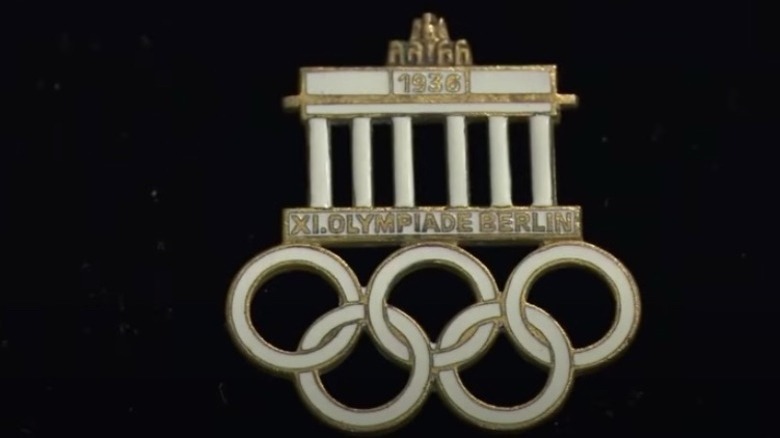The German Olympic Pin That Made It Onto Pawn Stars
Despite the plethora of unique items that cross Rick Harrison's counter at the Gold & Silver Pawn Shop, he seemed genuinely surprised to see the slice of sports history one seller brought in on an episode of "Pawn Stars." And the story behind it was strange, too.
While playing poker in Arkansas, seller Harold was seated with an old German man nicknamed "Goose." Harold won some money in the game, but the man only had enough for a partial payment on him. So what did he offer instead? A small, gold pin from the 1936 Olympic Games in Berlin, Germany.
It was odd that the pin had found its way from Germany to Arkansas to Las Vegas over the years. And horrifying to contemplate its history, considering the connection to Nazi Germany, where, in those early years of Hitler's power, Jewish athletes weren't allowed to compete for their country in the Games (via the United States Holocaust Memorial Museum). It was a harbinger of much worse to come, and we can only hope Harold took the pin's symbolism more seriously than he showed on camera.
"I want to sell this pin today because it's finally time to collect the hundred bucks that old 'Goose' owes me," Harold said (via YouTube).
Rare? Not exactly, but it still had historical significance
It certainly seemed a German Olympic pin would be worth at least $100. And Rick seemed to recognize that its history upped its value. "This is pretty cool," he said, inspecting the item (via YouTube). "This was the first mega Olympics like we're used to today where it's like this grand event."
That may sound like Rick was simply all-in on the item. However, he made his opinion clear when it came to the pin's history, noting Berlin was granted the right to host the Olympics before Hitler came into power. "Hitler wanted to show the world that he had the master race and the greatest economy and all this other stuff, and all he really did was show the world that he was an a**hole," Rick said. He noted that the Olympic Committee "never expected this racist a**hole to be running the Olympics."
His position on the era established, Rick was ready to deal. And Harold was hoping to make $300 on the pin. It was a surprising bid for $200 more than he claimed the old man owed him in that poker game.
Knowing the pin was far from rare, Rick offered the seller $75. When Harold asked him to go up to $200, though, Rick relented. For $100, Harold had his debt settled, and Rick became the owner of an Olympic pin with significant historical worth.

